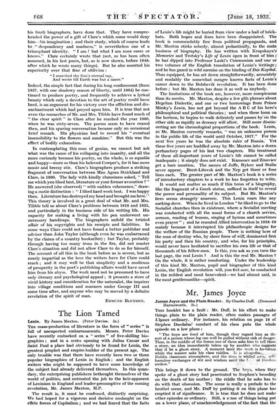The Lion Tamed
Lenin. By James Maxton. (Peter Davies. 5s.) THE mass-production of literature in the form of " series " is full of unexpected embarrassments. Messrs. Peter Davies have recently embarked on a " series " of five-chilling bio- graphies ; and in a series opening with Julius Caesar and Saint Paul a place had obviously to be found for Lenin, the greatest prophet and empire-builder of the present age. The only trouble was that there have recently been two or three popular biographies of Lenin in English ; and the English writers who might be supposed to have some knowledge of the subject had already delivered themselves. In this quan- dary, the enterprising publishers bethought themselves of the world of politics, and entrusted the job to the heir-apparent of Leninism in England and leader-presumptive of the coming revolution, Mr. James Maxton, M.P.
The result is, it must be confessed, distinctly surprising. We had hoped for a vigorous and decisive onslaught on the effete forces of Capitalism ; and we had feared that the facts of Lenin's life might be buried from view under a hail of briCk- bats. Both hopes and fears hive been disappointed. The book is commendably free from political propaganda, and Mr: Maxton sticks soberly;-.almOst pedantically, to the main business of biography. He has written with Krujiskaya's' Memories and Trotsky's Life of tei2in Open in front of him;' he 'hai dipped into Professor' Laski's Communism and 'one 'or two volumes of the English translation of Lenin's writings and he has gazed in wild surmise on-the binding of Doi Kapil Thus equipped, he has set down straightforwardly, accurately and readably the soineWhat 'meagre known facts of Lenin'a career down to the Bolshevik revolution: It has been done before ; but Mr. Maxton has done it as -well as 'anybody.
The limitations of the book are, however, more cOnspieueus than its merits. Mr. Maxton, despite a few glib 'phrases about Hegelian Dialectic, and one or two borrowiiigs from Prince Mirsky's Lenin, has not got beyond the A B C of his hero's_ philosophical and politioal theories ;-- and when theie loOni on the horizon, he begins to walk delicately and passes by.ciii the Other side as rapidly as decency will'alloW. Still more'diseciii Certing are the thronologiCal proportions of the book: as - Mr. Maxton torreetly-remarks, " Was an unknown persici in the 'public life of the world until October,' 1917." For the next 'five years he 'Was the absolute rider- of Russia' Yet these five years" are huddled away by Mr:Mairton into a doien perfunctory pages of his last two chapters. HiS 'treatment of these all-important years of Lenin's life cannot be called inadequate ; it simply does not exist: Kamenev and ZiaiwieV get a bare mention. The names of Joffe, Rykey and Stem- never appear. Brest-Litovsk end. the Nep get three or four lines each. The greater part of Mr. Mai tOies book is a series Of introductOry chapters to a Work he has forgotten to write.
It would not matter' so Muth if this torso of a biography, llliethe"fragment of a Greek statue, sufficed in itself to reveal the' power and personality of its subject. But Mr. Maxton's hero seems strangely* anaemic. This Lenin rears like any Sucking-dove. When he lived in London " he liked to go to the Socialist churches then in existence, where a' SOCialist meeting was conducted with all the Usual forffla of a church service; sermon, reading of lessons, singing of hymns and sometimes even prayer " and he resented Allied intervention in 1918-19 mainly because it interrupted his PhiLanthropie designs' for the welfare of the RusSian people. There is nothing 'here of the man of destiny who, by sheer 'force of Vailf:doininated first his party and then his country, and' whd, for his Would never haVe hesitated to sacrifice his own or that"of thousands of his fellow7men: Is this, you ask as you torn the last page, the real Lenin ? And is this the real Mr. Maxton ? On the whOle, it ii rather Comforting.' Under the leadership of this kind Mr. Maxton, pupil and biographer of this kind Lenin, the English revolution will, you feel sure, be conduCted in the mildest and most benevolent—we had almost said, in the most gentlemanlike—spirit.








































 Previous page
Previous page